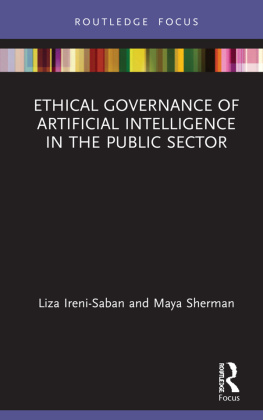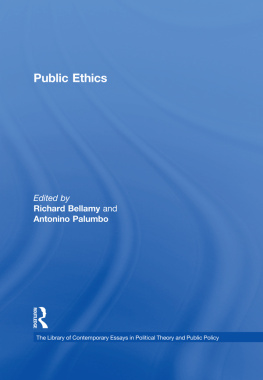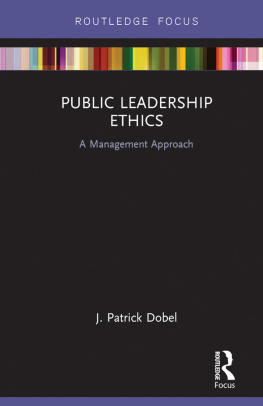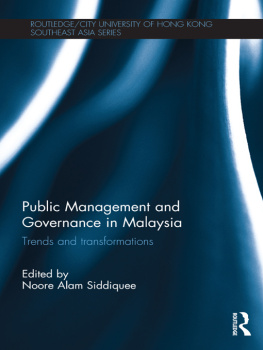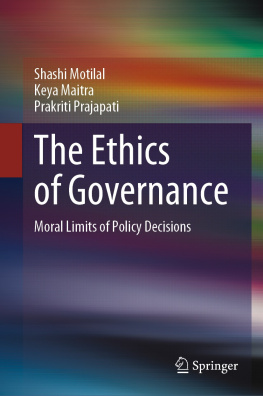Ethical Governance of Artificial Intelligence in the Public Sector
This book argues that ethical evaluation of AI should be an integral part of public service ethics and that an effective normative framework is needed to provide ethical principles and evaluation for decision-making in the public sphere, at both local and international levels.
It introduces how the tenets of prudential rationality ethics, through critical engagement with intersectionality, can contribute to a more successful negotiation of the challenges created by technological innovations in AI and afford a relational, interactive, flexible and fluid framework that meets the features of AI research projects, so that core public and individual values are still honoured in the face of technological development.
This book will be of key interest to scholars, students, and professionals engaged in public management and ethics management, AI ethics, public organizations, public service leadership and more broadly to public administration and policy, as well as applied ethics and philosophy.
Liza Ireni-Saban is the deputy dean and a senior lecturer at the Lauder School of Government, Diplomacy and Strategy, Interdisciplinary Centre (IDC) in Herzliya, Israel.
Maya Sherman is a student in Government, Diplomacy and Strategy at the Interdisciplinary Centre (IDC) in Herzliya, Israel.
Routledge Studies in Policy and Power
This series presents state-of-the-art analyses of the relationship between policy, politics and power. Transcending disciplinary boundaries, it recognises that policy formation is fundamentally a product of contestation between different social forces, interests, ideas and ideologies. Moreover, the implementation of policy is conditioned by these same elements, yielding actual policy outcomes and patterns of behavioral change that often deviate from both intentions and theoretical assumptions. The series encourages critically-oriented submissions focused on the latest developments in policymaking, implementation and outcomes from around the world.
Series editors: Toby Carroll, City University of Hong Kong, Hong Kong, Kelly Gerard, University of Western Australia, Australia, and Darryl S.L. Jarvis, Hamad Bin Khalifa University (HBKU), Qatar Foundation, Doha.
Ethical Governance of Artificial Intelligence in the Public Sector
Liza Ireni-Saban and Maya Sherman
Ethical Governance of Artificial Intelligence in the Public Sector
Liza Ireni-Saban and Maya Sherman
First published 2022
by Routledge
2 Park Square, Milton Park, Abingdon, Oxon OX14 4RN
and by Routledge
605 Third Avenue, New York, NY 10158
Routledge is an imprint of the Taylor & Francis Group, an informa business
2022 Liza Ireni-Saban and Maya Sherman
The right of Liza Ireni-Saban and Maya Sherman to be identified as authors of this work has been asserted by them in accordance with sections 77 and 78 of the Copyright, Designs and Patents Act 1988.
All rights reserved. No part of this book may be reprinted or reproduced or utilised in any form or by any electronic, mechanical, or other means, now known or hereafter invented, including photocopying and recording, or in any information storage or retrieval system, without permission in writing from the publishers.
Trademark notice: Product or corporate names may be trademarks or registered trademarks, and are used only for identification and explanation without intent to infringe.
British Library Cataloguing-in-Publication Data
A catalogue record for this book is available from the British Library
Library of Congress Cataloging-in-Publication Data
Names: Ireni Saban, Liza, author. | Sherman, Maya, author.
Title: Ethical governance of artificial intelligence in the
public sector / Liza Ireni Saban and Maya Sherman.
Description: Milton Park, Abingdon, Oxon ; New York, NY :
Routledge, 2022. | Series: Routledge studies in policy and power |
Includes bibliographical references and index.
Identifiers: LCCN 2021013604 (print) | LCCN 2021013605 (ebook) |
ISBN 9780367618087 (hardback) | ISBN 9780367618131 (paperback) |
ISBN 9781003106678 (ebook)
Subjects: LCSH: Artificial intelligenceMoral and ethical
aspects. | Artificial intelligenceGovernment policy.
Classification: LCC Q334.7 .I74 2022 (print) |
LCC Q334.7 (ebook) | DDC 172/.2dc23
LC record available at https://lccn.loc.gov/2021013604
LC ebook record available at https://lccn.loc.gov/2021013605
ISBN: 978-0-367-61808-7 (hbk)
ISBN: 978-0-367-61813-1 (pbk)
ISBN: 978-1-003-10667-8 (ebk)
DOI: 10.4324/9781003106678
Typeset in Times New Roman
by Newgen Publishing UK
Contents
The growth of Artificial Intelligence (AI) applications has led to unprecedented social, ethical and legal implications, as recently seen in salient technological affairs in the public sphere. Controversial affairs such as the Cambridge Analytica data scandal and the autonomous car fatality in Arizona have brought the ethical dimensions of advanced technological developments to the forefront. Experts both from within the tech world and without having started to confront issues that drive home the anxiety society faces with unfettered technological progress: What are the ethical boundaries of technological determinism? and, What philosophical theory can correctly channel human ethical behaviour against the backdrop of exponential technological development?
The scholarly discourse has not properly addressed the impact of AIs technological loopholes on the public sector and the needed governmental and civil confrontation. AI technologies are often criticized due to their potentially biased and harmful implications, which impact certain groups of individuals. A substantial body of research has elaborated upon the inherent loopholes of these technologies, with emphasis on AI bias, transparency and accountability. Important to note, AI does not necessarily create new bias, but may reinforce existing human bias, since humans are relatively autonomous and flawed creatures employing these technologies to their own ends.
Due to the growing use of AI in the public sector, these challenges have the potential to undermine the appropriateness of decision-making processes in the public sphere, and therefore must be properly tackled or moderated at the local and international levels. An effective normative framework must provide ethical principles of decision-making, suggest applications appropriate for use, and acknowledge the dignity, rights and public interest at stake in the situated use of AI techniques. Therefore, it is of paramount importance to set an ethical framework that is flexible enough to accommodate these challenges and ensure that core public and individual values are still honored in the face of technological development, in order to provide practical solutions to the binary and government implications parallelly.
The question is then, how can tools of ethical governance in contemporary democracies bridge the gap between the tech giants, whose initial priority is to monetize their products and platforms, and the public good, highlighting the civil will and ones inherent rights? Compared to alternative and more traditional ethical approaches, we suggest that prudential rationality ethics can become a means for public administrators to negotiate the challenges posed by the implementation of AI technologies in the public sector. The prudential aspect of rationality brings a relational, interactive, flexible and fluid framework that meets the features of AI research projects. We propose that the ethics of prudential rationality could develop familiarity with the theoretical lens of intersectionality. Our aim in this book is to explore how prudential ethics can be enhanced through critical engagement with intersectionality in a way that the biases and problems built into AI techniques are clearly evaluated and framed in the public service.

